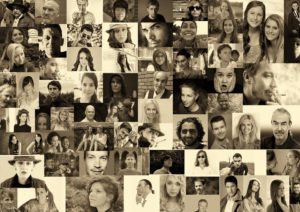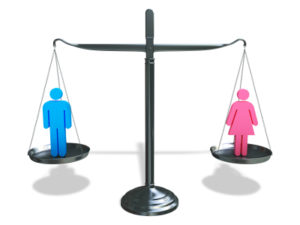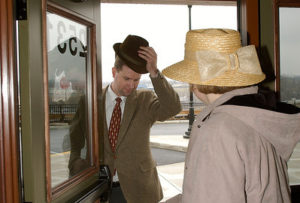
I recently received an email from someone who questioned me on a comment I made about manners. I had said that manners presuppose distinctions. They call upon us to honor those who are excellent with special treatment. At the same time, they allow us to show compassion and consideration toward those who are lesser or weaker. I claimed crass egalitarianism leads to today’s uncivil society.
The reader took issue with these affirmations saying that all people are children of God and therefore everyone should have the right to be treated equally regardless of who they are or what they have achieved. Hierarchical distinctions are mere fabrications that create resentments and must be avoided.
The email surprised me since I had never really thought about such an objection. Treating others differently seemed very natural to me. However, it now occurs to me that others might share the objection and so out of special (and unequal) consideration to them, I thought it would be good to provide an answer.
Two main problems need to be resolved.
Equal in Essence and Nature
The first is to clarify the confusion between essence and accidents in dealing with human nature.
I am the first to admit that all men are equal in their essence as humans. As such, we are all entitled to some fundamental rights, among them the right to life, honor, property, family and Faith. These rights generate in turn certain universal manners of treatment that we deem humane since they are proper to our nature.
[like url=https://www.facebook.com/ReturnToOrder.org]
From the perspective of the essence of our human nature, all should be treated equally. There should be basic manners that are universally applicable and expected. Everyone knows, for example, that we must not treat others rudely or brutally. We must respect their fundamental dignity.
Up to this point, I can well agree with my reader about this basic level of manners.
Accidents Change Everything
That leads to the second problem—dealing with our accidents. Things get complicated when you start to consider that humans are unequal in their accidents. People are vastly different when we look at their virtue, talent, beauty, strength, family, tradition, and so many other defining characteristics.

These inequalities of talents, abilities, and circumstances result in an ordered hierarchical society where individuals or groups have specific leadership roles and functions, just as members in a body play key roles. This naturally tends to distill different manners of treatment and consideration.
That is to say, hierarchy is not fabricated but part of the natural order of society. Pope Saint Pius X in his motu proprio Fin Dalla Prima states: “Human society, as established by God, is composed of unequal elements, just as the different parts of the human body are unequal; to make them all equal is impossible, and would mean the destruction of human society.”
Thus, an array of different manners helps us exteriorize these distinctions that come from inequality in society. Manners help us make these distinctions known to others.
Honoring of Authority

The need to make distinctions is particularly clear in the case of offices and authority. We are commanded by God to honor our father and mother and all legitimate authority since all authority comes from God. This implies a different treatment because there are others that are not so honored since they do not share this authority.
Honor is the esteem shown someone. One key way it is publicly manifested is by manners and etiquette. Thus, the loving manners by which we honor our mothers, for example, are vastly different from the simpler manners shown to other ladies. When we address a judge as “Your Honor” and show him great respect, we recognize the high purpose of justice in society. The priest is called “Father” and treated with reverence because of our high regard for his sacred office.
Failure to recognize this authority through exterior signs weakens the office and the good order of society. That is why the classroom where distinctions between teacher and students are minimized and egalitarianism informs speech and behavior is a recipe for disaster.
Honoring Achievement
There is another way in which manners are applied unequally. This consists in giving public honor in recognition of deeds or achievements.

If these deeds are done for the benefit of the nation, then society owes them a debt of gratitude and such persons should in all justice be publicly recognized. If a personal achievement represents a milestone of excellence that enriches all society, then it is just that the person be acknowledged since it benefits the common good.
This is what we do when we recognize and thank soldiers for their service and sacrifice. That is also why we honor the hard work and erudition of someone with a doctorate degree by addressing the individual with the just title of doctor (which I found before the email signature of my objecting reader).
We naturally treat with special deference a Medal of Honor recipient, a Nobel Prize winner or anyone who makes the nation proud of their achievements.
Such manners and public treatment are good for society since it teaches the virtue of gratitude to others. It provides an opportunity for justice whereby we give to others that which is their due. Those honored benefit society immensely since they are models that serve to motivate others to strive for excellence.
Misguided Compassion
Such arguments should make sense even in our egalitarian world. However, I suspect that the cases mentioned above did not get to the core of why many people wish equal manners for everyone.

Many have an aversion to treating people unequally because they have a misguided notion of compassion. They think that by honoring someone greater, we make someone lesser suffer. They associate inequality with pride and brutality. They believe that the only way to avoid this false dilemma is to disguise excellence and treat everyone the same. In this way, we supposedly practice compassion and Christian charity.
The opposite is true. Society is enriched by the enormous inequality of offices, conditions and circumstances. Manners are the habit of thinking about others and acknowledging these social differences. A book of manners is a collection of established formulas that harmonize different sectors of society. Manners need not only be rules, but they can also be touching expressions of tenderness, consideration and affection that express true compassion.
By putting excellence and vulgar behavior on equal footing, we do no favor to anyone. People practice true Christian charity when they do their duty to shine in virtue and excellence. It is wrong to deprive people of their right to have models before their eyes that they might imitate and admire. Manners help bring out the best in us. Everyone, and society itself, is elevated by them.
Nothing More Brutal
The final problem with treating everyone equally is that the logic of this false compassion inevitably leads to adopting the lowest common denominator of manners to prevent the suffering of the lowliest. Worse, it leads to turning each person into the supreme judge of what constitutes these manners since each subjectively assesses what causes one the least suffering.
What Does Saint Thomas Say About Immigration?
Thus, some turn manners into only that which pleases them and takes the least effort. Others retreat into an individualistic world in which they see no real need for manners beyond those serving their self-interest. In the frenetic intemperance of the world of instant gratification, so many discard manners and glorify vulgarity. This attitude embeds a universal code of rudeness that well characterizes our egalitarian society.
Indeed, I fear the day when all manners will be declared equal. There is nothing more brutal than a false compassion that suppresses all excellence. There is no greater tyrant than the self-centered individualist who does not take others into consideration. There is no worse intolerance than those who claim to tolerate everything in the name of Christian charity.
All this leads to a politically correct world that refuses to recognize any superiority or inferiority—even the most obvious ones for fear of offending others with the truth. In short, it leads to the uncivil society that has so polarized and fragmented our nation.
And so I rest my case. I have tried to argue it calmly but passionately, logically but with all due respect to those who might object. If we are to return to order in civil society, I politely suggest that we must not treat all manners equally.
As seen on crisismagazine.com


